|
Anthologies
Selected or Edited by Ian Hamilton
|
The Poetry of War, 1939-45
|
|
Book: (London: Alan Ross,
1965)
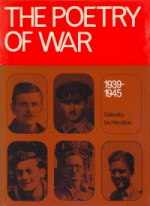 From
the Introduction: From
the Introduction:
'The poets represented in
this anthology were all members of the Armed Services at one
time or another during the 1939-45 war, and the poems have
been separated into what seem the most significant broad categories
of subject matter. There is always a certain artificiality
in this kind of division, but it seems appropriate here and
it has been done sparingly. A brief selection of war poems
from Americans has been added, but more as a useful side-glance
than anything in the least definitive.
'I am particularly pleased
to be able to include a series of prose statements from a
number of the poets themselves; I trust that these will compensate
for whatever seems too literary and speculative in my own
approach to the period these poets lived through'.
|
| |
|
Alun Lewis: Selected
Poetry and Prose
|
| Book: (London: George Allen
and Unwin, 1966)
With a biographical introduction by Ian Hamilton
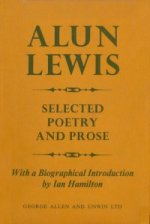 From
the Introduction: From
the Introduction:
' "I consider my poems
as expressions of personal experience," wrote Alun Lewis,
and I take this as excuse enough for offering as introduction
to this selected edition not a formal attempt at critical
‘placing’, but an account -- based as far as possible
on Lewis’s own letters and journals -- of the kind of
experience that was most important in the shaping of his work.
Judgement, of course, comes into this -- as it must with a
writer as good but as uneven as Lewis -- but I will try not
to let it obtrude. My main editorial aim has been to chronicle
the life and recommend the work of a writer who seems to me
to have been shamefully neglected in the twenty-odd years
since his death. [...]
'There is still a certain
amount of speculation surrounding the exact circumstances
of Lewis’s death; it has not been possible to consult
the proceedings of the military Court of Inquiry that judged
it to be Accidental, and the few verbal accounts that I have
come across have been inconsistent and mostly second-hand.
But it surely does not matter, except in the most narrow documentary
terms, that we do not know such details. What we are
aware of is that, whatever happened, Lewis was prepared for
it, and that from his tremendous effort of self-exploration
we have the poems and stories from which this volume is selected.
They tell us what Lewis wanted us to know'.
|
| |
|
The Modern Poet
|
| Book: (London: Macdonald
and Jayne's, 1968 / New York: Horizon, 1969)
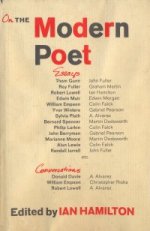 From
the Editor's Note: From
the Editor's Note:
'The Modern Poet
is a selection of essays from the first fifteen issues of
the Review, a small magazine of poetry and criticism
which I founded in 1962. Apart from one or two very minor
emendations, the essays appear here as originally published.
I have also included three “conversations” --
the now celebrated dispute between A. Alvarez and Donald Davie
and interviews with William Empson and Robert Lowell -- and
a few poems.
' A publication like the
Review needs friends almost as much as it needs enemies,
and I could fill a page with messages of gratitude to all
those who have helped the magazine in one way or another.
The chief debt, though, is to its contributors who, unpaid
and uncomplaining, have turned in work which, in my view,
ranks with the best poetry criticism of the last decade'.
Contents:
Colin Falck: ‘Dreams
and Responsibilities’, 1
John Fuller: ‘Thom Gunn’, 17
Graham Martin: ‘Roy Fuller’,
23
Ian Hamilton: ‘Robert Lowell’,
32
Edwin Morgan: ‘Edwin Muir’, 42
Colin Falck: ‘William Empson’,
50
Gabriel Pearson: ‘Yvor Winters’,
64
A. Alvarez: ‘Sylvia Plath’, 73
Francis Hope: ‘The Thirties’,
83
Martin Dodsworth: ‘Bernard Spencer’,
90
Colin Falck: ‘Philip Larkin’,
101
Gabriel Pearson: ‘John Berryman’,
111
Martin Dodsworth: ‘Marianne Moore’,
125
Francis Hope: ‘Tommy’s Tunes’,
134
Colin Falck: ‘Alun Lewis’, 141
John Fuller: ‘Randall Jarrell’,
151
Conversations:
‘A New Aestheticism?
A. Alvarez talks to Donald Davie’, 157
‘William Empson in conversation with Christopher Ricks’,
177
‘Robert Lowell in conversation with A. Alvarez’,
188
Poems:
A. Alvarez, Thomas Clark,
Colin Falck, Michael Fried, John Fuller, Ian Hamilton and
Hugo Williams
|
| |
|
Eight Poets
|
|
Pamphlet: (London: Poetry
Book Society, 1968)
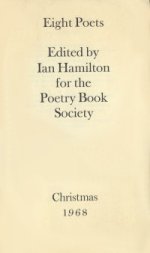 Contents: Contents:
Alan Brownjohn: 'Fortune'
Donald Davie: 'Winter
Landscape'
Colin Falck: 'Promises'
Michael Fried: 'Like
Fast Cars', 'The First Snow', 'The Knock'
John Fuller: 'Cradle
Lecture'
David Harsent: 'Storm',
'Home Movies'
Jon Stallworthy: 'Daybreak
with Horses'
Anthony Thwaite: 'Augustine
at Carthage'
|
| |
|
Robert Frost: Selected Poems
|
|
Book: (London: Penguin, 1969
/ New York: Holt, Rhinehart and Winston, 1969)
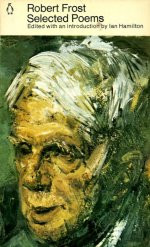
|
| |
|
Poems Since 1900
|
|
Book: (London: Macdonald and
Jane's, 1975)
An Anthology of British and American Verse in the Twentieth
Century
Editedy by Ian Hamilton and Colin Falck
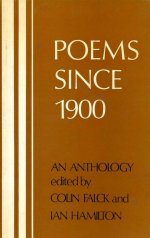 From
the Introduction: From
the Introduction:
'This anthology was compiled
over a longish period with no particular theory in mind and
we offer it to the reader now with out (as Wordsworth put
it) any "foolish hope of reasoning him into an
approbation of these particular poems". Modern poetry,
for many people, means a specialised activity demanding from
its adherents some detailed and up-to-date ideas about the
poetic movements, theories, manifestoes and controversies
of the recent past. Otherwise, perhaps, it means the rather
mindelss charm of "pop" poetry. And yet there must
surely be people all over Britain, America and wherever else
English poetry is still written or read who would welcome
a collection of modern poems which do not insult their intelligence
or their common sense and which do not on the other hand require
them to swallow any particular theoretical pill along with
what they read. It is to them, anyhow, that we dedicate this
book.'
|
| |
|
Yorkshire In Verse
|
| Book: (London: Secker and
Warburg, 1984)
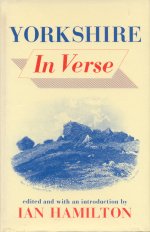 From
the Introduction: From
the Introduction:
'My credentials for assembling
an anthology of Yorkshire verse may be thought meagre by true
locals, so perhaps I should declare myself. I was born of
Scots parents in East Anglia and even my “Yorkshire
years”, as I sometimes like to call them, were not really
spent within the county boundaries: I lived across the Tees
in Darlington, County Durham. Even so, I’d plead as
follows: my time in Darlington was from 1952 to 1958 -- I
was thirteen when I moved there and twenty when I left, and
my sense of who I was and where I came from was always more
North Riding than Newcastle. Yorkshire was a mere hike from
my front door; to get to Newcastle, or Durham, you had to
take a train. Of the three big North-East soccer teams, my
loyalty was to Middlesbrough rather than to the men of Tyne
and Wear. The Yorkshire Dales were the Darlingtonian’s
weekend retreat, and the first “country verse”
I ever tried to write was set somewhere between Croft and
Barnard Castle. Indeed, even today, my small stock of rural
imagery is largely Yorkshire-based'.
|
| |
|
The New Review Anthology
|
|
Book: (London: Heinemann,
1985)
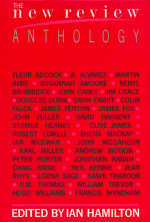 From
the Introduction: From
the Introduction:
'This anthology is meant
to give the 'flavour' of the magazine, but at the same time
it has to stand up as a book. A magazine's flavour, after
all, is often more to do with its ephemera than with its more
weighty, lasting contributions'.
Contents:
Jim Crace: Annie,
California Plates, 9
Douglas Dunn: Two Poems, 19
James Fenton: Wild Life Studies, 21
Francis Wyndham: Out of the War, 26
Jean Rhys: Sleep It Off Lady, 36
Clive James: Kingsley Amis, 47
Ian McEwan: Solid Geometry, 65
Robert Lowell: John Crowe Ransom 1888-1974, 80
Colin Falck: Cat Gone, 87
John McGahern: The Beginning of an Idea, 89
Peter Porter: An Australian Garden, 104
John Fuller: Sleeping Out At Gallt-y-Ceiliog, 107
Gaven Ewart: Just a Smack at, 108
A. Alvarez: He Said, She Said, 109
John Carey: Down with Dons, 111
David Harsent: Fishbowl, 124
Willam Trevor: In Isfahan, 127
Neil Rennie: The Cargo, 146
Susannah Amoore: An Upstairs Kitchen, 148
Karl Miller: Are You Distraining Me?, 150
James Fox: A Bad Day for Eton, 163
Shena Mackay: Curry at the Laburnums, 201
Hugo Williams: Bar Italia, 215
Martin Amis: It's Disgusting at Your Age, 216
Fleur Adcock: The Soho Hospital for Women, 231
D. M. Thomas: Lorca, 235
Craig Raine: Two Poems, 237
Jonathan Raban: Living on Capital, 239
Lorna Sage: The Savage Sideshow: A Profile of Angela
Carter, 259
Andrew Motion: Anniversaries, 277
Robert Lowell: Summer Tides, 281
Beryl Bainbridge: Facing Backwards, 283
Hugo Williams: Bard on the Road, 291
Seamus Heaney: Two Poems, 308
Shashi Tharoor: The Loneliness of the Short Story Writer,
310
|
| |
|
Soho Square II
|
|
Journal: (London: Bloomsbury,
1989)
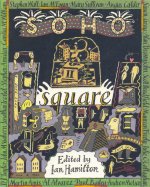 Contributions
by: Contributions
by:
Gavin Ewart: 'We Shall
FInd Out'
Simon Gray: Still Trying
Peter Dale: Two Poems
Scott Bradfield: Sweet Ladies, Good Night, Good Night
Peter Porter: Two Poems
Martin Amis: Emergency Landing
James Lasdun: Two Poems
Mary Sullivan: Pigaunt
Cathy Bowman: Two Poems
Stephen Wall: The Bridge
Christopher Reid: Hotels
Angus Calder: Stumps of Time
Dyan Sheldon: Serfs
Fleur Adcock: Two Poems
Ian McEwan: Berlin
Craig Raine: Night Train
Nigel Williams: Extracts from The Good Doctor -- A
Comedy
John McGahern: Monaghan Day
James Fenton: On a Recent INdiscretion in Upper Egypt
by a Certain Fulbright Fellow
Paul Bailey: In November, 1948
Carol Rumens: Munich
D. J. Taylor: On the Strip
Harold Pinter: Two Poems
Candia McWilliam: Sweetie Rationing
Andrew Motion: Judgement
David Holden: A Right Old Seeing-to
David Mamet: When I Was Young and A Thank You Note
Julie O'Callaghan: Two Poems
Malcolm Lowry: Extract from the Screenplay -- Tender
is the Night
Dan Jacobson: Two Poems
Marureen Freely: The Babysitter
Alan Brownjohn: Extract from Sea Pictures
A. Alvarez: Doctor in the House
Helen Dunmore: One Yellow Chicken
John Fuller: Lesson of the Master
Susannah Clapp: Reader, I Married Them
Stephen Amidon: Echolocation
David Harsent: Elsewhere
Jonathan Treitel: Head in the Sand
Illustrations by:
Ian Beck, Guy Billout, Debbie
Cook, Susan Curtis, Jeff Fisher, George Hardie, Clifford Harper,
Benoît Jacques, Andrew Kulman, Paul Leith, Michael Leunig,
Pierre Le-Tan, Sarah Maxey, Philip Piesbecker
|
| |
|
Bloomsbury Classics
|
|
Books: (London: Bloomsbury,
1992-1999)
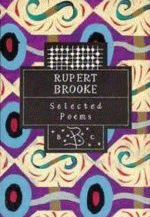 Ian
Hamilton edited over forty selections of English poets for the
Bloomsbury Poetry Classics series. Ian
Hamilton edited over forty selections of English poets for the
Bloomsbury Poetry Classics series.
Thomas Hardy, 1992
Emily Dickinson, 1992
Christina Rossetti, 1992
Gerard Manley Hopkins, 1992
Matthew Arnold, 1993
Elizabeth Barrett-Browning, 1993
Samuel Taylor Coleridge, 1993
John Donne, 1993
John Keats, 1993
Walt Whitman, 1993
William Blake, 1994
Emily Brontë, 1994
Robert Browning, 1994
Robert Burns, 1994
Lord Byron, 1994
John Dryden, 1994
Rudyard Kipling, 1994
Alexander Pope, 1994
William Shakespeare, 1994
Percy Bysshe Shelley, 1994
Alfred Tennyson, 1994
William Wordsworth, 1994
Wilfred Owen, 1994
Rupert Brooke, 1995
Sir Walter Scott, 1995
Edward Thomas, 1995
Oscar Wilde, 1995
Andrew Marvell, 1995
W.B. Yeats, 1995
John Clare, 1996
Robert Herrick, 1996
John Milton, 1996
Thomas Grey, 1997
George Herbert, 1997
Edward Lear, 1997
Elegies, 1997
Love Sonnets, 1997
Odes, 1997
Algernon Charles Swinburne, 1999
Charlotte Mary Mew, 1999
Geoffrey Chaucer, 1999
Henry Wadsworth Longfellow, 1999
Edgar Allan Poe, 1999
|
| |
|
Oxford Companion to Twentieth-Century
Poetry
|
| Book: (Oxford: Oxford University
Press, 1996)
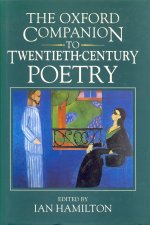 From
the Introduction: From
the Introduction:
'[T]his is not a critical
anthology; nor is it a textbook. I want it to be seen as serious
and useful, but I will not at all mind if it is read for fun,
as a kind of documentary-entertainment. For those who like
making lists, as I do, I here offer a few leads (all figures
are approximate, and susceptible to computerized riposte).
The Companion covers about 1,500 poets, 100 subjects.
Of the poets, 550 are British, 550 American. Other territories
break down as follows: Australia (120), Canada (110), Africa
(60), Asia (40), New Zealand (35), Caribbean (30). There are
about 200 women and 100 black writers. Twenty-seven poets
had nervous breakdowns, fifteen committed suicide, and fifteen
were/are diagnosed as alcoholic. Nineteen served time in jail,
fourteen died in battle, three were murdered, one executed.
Zany professions include lumberjack, tax inspector, furniture
remover, carpet salesman, and policeman, but of course the
vast majority of poets earn their living in universities.
The most popular off-campus day-job is that of doctor or psychiatrist.
Only one poet has played hockey for his country.
'Ezra Pound is most often
mentioned as an influence on other poets, with Auden, Yeats and Williams runners-up. Eliot is named less
often than Lowell and Stevens. Rilke is the most influential
foreign poet. More poets died in their seventies than at any
other time of life. More lived past the age of 80 than died
young (that is, before the age of 40). The most popular year
to be born in was 1947, with 1934 not far behind. The dominant
poetic star-sign is ...'
|
| |
|
Between the Lines
|
| Books: (London: Between
the Lines, 1998-2001)
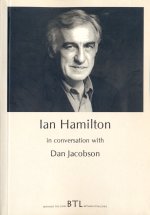 Between
the Lines was the brainchild of Ian Hamilton. He proposed the
series over dinner with Philip Hoy and Peter Dale in late 1997.
They built the series on the idea of publishing unusually wide-ranging
and unusually deep-going interviews with some of today’s
most accomplished poets. J. D. McClatchy joined the editorial
board in 1998, and Ryan Roberts joined as Editorial Assistant
in 2002. Between
the Lines was the brainchild of Ian Hamilton. He proposed the
series over dinner with Philip Hoy and Peter Dale in late 1997.
They built the series on the idea of publishing unusually wide-ranging
and unusually deep-going interviews with some of today’s
most accomplished poets. J. D. McClatchy joined the editorial
board in 1998, and Ryan Roberts joined as Editorial Assistant
in 2002.
The series is ongoing, but those titles published while Hamilton
was alive include the following:
W.D. Snodgrass in Conversation
with Philip Hoy, 1998
Michael Hamburger in Conversation with Peter Dale, 1998
Anthony Hecht in Conversation with Philip Hoy, 1999
Thom Gunn in Conversation with James Campbell, 2000
Richard Wilbur in Conversation with Peter Dale, 2000
Seamus Heaney in Conversation with Karl Miller, 2000
Donald Justice in Conversation with Ian Hamilton, 2001
|
| |
|
Penguin Book of
Twentieth-Century Essays
|
| Book: (London: Penguin,
1999)
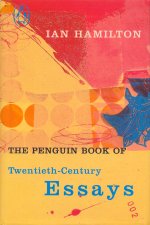 From
the Introduction: From
the Introduction:
'An essay is not poetry,
an essay is not fiction, and yet now and then -- as White
himself has shown when he gets down to work -- it can partake
of both the fictional and the poetic. There are no set structures
-- although the best essays, examined closely enough, will
turn out to have plenty of order, coherence and proportion.
As with Montaigne, they may look accidental but they’re
not. An essay can be personal; it can be public. It can philosophize,
it can polemicize, but it can also fail to look beyond its
author’s own backyard. It can be an extended book review,
a piece of reportage, a travelogue, a revamped lecture, an
amplified diary-jotting, a refurbished sermon. In other words,
an essay can be just about anything it wants to be, anything
its author chooses to "essay" '.
|
| |
|




 From
the Introduction:
From
the Introduction:  From
the Introduction:
From
the Introduction:  From
the Editor's Note:
From
the Editor's Note:  Contents:
Contents:

 From
the Introduction:
From
the Introduction:  From
the Introduction:
From
the Introduction:  From
the Introduction:
From
the Introduction:  Contributions
by:
Contributions
by: Ian
Hamilton edited over forty selections of English poets for the
Bloomsbury Poetry Classics series.
Ian
Hamilton edited over forty selections of English poets for the
Bloomsbury Poetry Classics series.  From
the Introduction:
From
the Introduction:  Between
the Lines was the brainchild of Ian Hamilton. He proposed the
series over dinner with Philip Hoy and Peter Dale in late 1997.
They built the series on the idea of publishing unusually wide-ranging
and unusually deep-going interviews with some of today’s
most accomplished poets. J. D. McClatchy joined the editorial
board in 1998, and Ryan Roberts joined as Editorial Assistant
in 2002.
Between
the Lines was the brainchild of Ian Hamilton. He proposed the
series over dinner with Philip Hoy and Peter Dale in late 1997.
They built the series on the idea of publishing unusually wide-ranging
and unusually deep-going interviews with some of today’s
most accomplished poets. J. D. McClatchy joined the editorial
board in 1998, and Ryan Roberts joined as Editorial Assistant
in 2002. From
the Introduction:
From
the Introduction: